Thelonius Monk‘s sheet music transcriptions are available from our Library.
Chords and Voicings: From Lead Sheet to Performance
In modern jazz, seventh chords specified by lead sheets may appear simply as shown in figure 4.2a, but musicians rarely follow what the lead sheet specifies to the letter. Well before Thelonious Monk came on the scene, jazz pianists vied to distinguish themselves with ingenious voicings. A kind of common practice prevailed in bebop, though we emphasize that musicians can and did step outside this practice in search of particular expressions and logics. In the main, though, four complementary techniques developed, two concerning voicing as such and two concerning chord choice—what chord to play where:
Voicing
• Extension and omission: addition of tones foreign to the chord proper, and/or dropping tones that are part of it
• Spacing and doubling: distribution of a voicing on the piano or among instruments in an ensemble.
Harmonic choice
• Substitution: replacement of one chord by another with equivalent function
• Insertion and deletion: increase or decrease in the rate of harmonic motion by adding to or subtracting from changes specified on the lead sheet.
Extension, omission, spacing and doubling
Figures 4.2b and 4.3 illustrate possibilities for extending minor seventh, dominant seventh, and major seventh harmonies, and apply them to the initial ii–V–I of ISC. In the first staff each chord is extended upward by thirds beyond the seventh to include the ninth, eleventh, and thirteenth above the root. Each of the resulting seven-note stacks of thirds includes all notes of the D major scale. The fact that all three chords extend through the exact same pitch collections, in the same intervallic arrangement (i.e., a stack of thirds), demonstrates the fundamental role that harmonic function—and not chord or voicing—plays in determining tonal meaning in jazz.
The chords could in some cases even be voiced in identical ways, but their functional context would make them heard and understood differently. Here is a significant way in which, it seems to us, jazz harmony differs in emphasis from European practice.
To the extent that the distinction between ii, V, and I voicings blurs, what is it precisely that distinguishes their functions? The second staff shows which of the seven diatonic tones are directly involved in the progression toward and away from the V chord’s tritone.
Typically, these tones are necessary and sufficient to convey harmonic function. Surprisingly for anyone familiar with European harmony, neither the fifth nor the root of the chord are necessary; indeed these may be dropped (and possibly supplied by a bass player, but not necessarily). But in order to convey function and quality most effectively, the essential tones are typically arranged in the lower register of the voicing, with extension tones higher up.
The third staff of figure 4.2b distills the optional diatonic tones, which may be used without diluting function or quality, and the fourth staff shows how the tonic note (D) and the fourth scale step (G) are carefully avoided in the dominant and tonic chords, respectively, so as not to carry them over from the chords that precede them, which would impede the ii–V–I motion (see dashed arrows).
Outside the diatonic pitch collection remain fi ve tones completing the chromatic aggregate, which can provide rich “upper structures” to voicings. In some cases these work against important diatonic intervals; for example, using a G with the Em chord could obscure the minor third between E and G; using it with the A7 chord would weaken the C#/G tritone. But with the DM7 it sounds all right because its diatonic “shadow,” G, is already avoided. Figure 4.3 sketches the effect of chromaticism in each chordal context.
All optional diatonic and chromatic tones may be withheld or used, and they may be spaced from low to high in limitless ways. Attention is paid to the choice of lowest pitch, the registers of all others, thickness (number of notes played at once), and the use of some pitches in more than one octave doubling. This topic is discussed later in reference to specifi c instances in short excerpts by pianists Bill Evans and Oscar Peterson (figures 4.4a and b), and also at length in relation to Monk.
Chord Substitution, Insertion, and Deletion
Because every dominant-quality seventh chord shares its tritone with the dominant-quality seventh chord whose root is a tritone away, the chords in each such pair may be substituted for one another ( figure 4.2c, first staff).
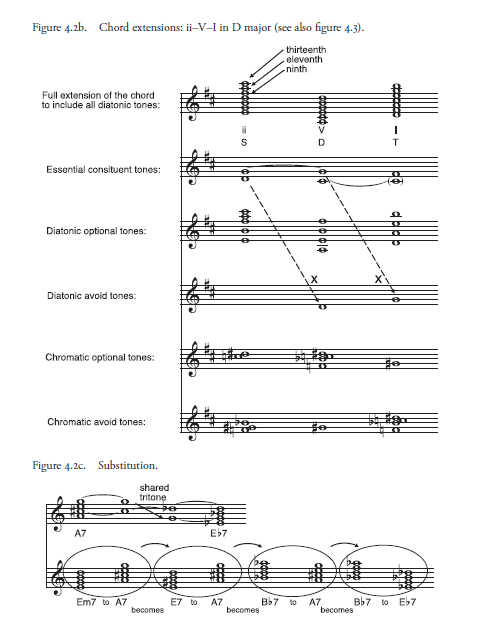
Substitutions for V are idiomatic in ii–V–I motion. In D major, this turns Em7–A7–DM7 into Em7–Eb7 –DM7 and causes the roots to descend chromatically by half step rather than by fifth, an especially characteristic marker of modern jazz sound. The second staff of figure 4.2c illustrates another kind of substitution, involving change of chord quality. In the first stage, the ii of
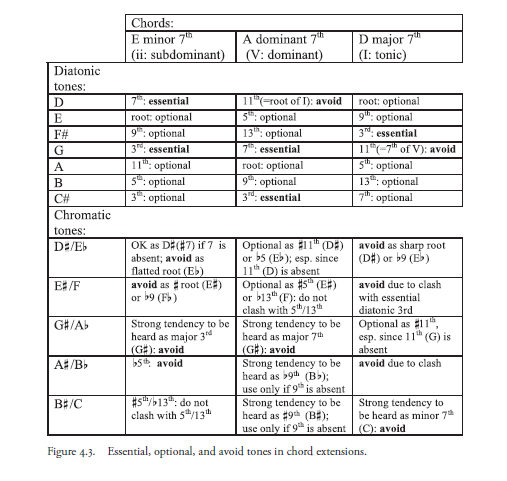
the ii–V–I progression is intensifi ed by raising its third from G to G# . This makes it E7, a dominant seventh chord, that is, V7 in relation to the A7 chord, and thus “tonicizes” the root of A7 as if A were momentarily the home key. From here it is a matter of applying the tritone substitution principle just discussed to convert the pair of chords into progression from Bb7 to Eb7. Monk does just this in ISC ( figures 4.1 and 4.5 , mm. 15-16).
Harmonic rhythm is the rate at which harmonies change. A scan of the various versions of ISC in figure 4.1 shows chords changing usually every two or four beats, though Oscar Peterson achieves special intensity in mm. 1-2 by changing on each beat, and there are scattered instances of chords held longer. Since harmony’s depth of field is rich, even with these severe constraints on harmonic rhythm there can be infinite ways to realize the harmonies in a song and suggest unexpected aural routes through it.
Sometimes root progressions by fifth are concatenated, as in figure 4.1, staff 2, mm. 2-3. Here, rather than have mm. 3-4 be a repetition of mm. 1-2, as it is in Monk’s version (staff 3), the ii chord of m. 3 is treated as a local tonic and preceded by its own ii–V. The two new bass tones F and B are part of the D major scale, so the motion feels activated but the connections do not jar.
The major third (D#) of the B7 chord is the only chromatic alteration implied. In Bill Evans’s version, the bass player faithfully provides the root tones (figure 4.4b), but Evans does not reflect the change on the piano. Without the D#, the feeling of tonicization is absent, and we have labeled the chord as Bm7.
Earlier we mentioned a more deeply hued insertion, at mm. 8 and, which introduces a ii–V (Gm7 to C7) progression borrowed from F major, a key built on a tonic foreign to the D major scale. This motion is so distinctive that it might be heard as one of the strongest markers of the song as a whole. In the fake book version, after slipping momentarily toward F in this way the music slips right back to DM7 in m. 9.
Monk, however, reinterprets the C7 as a tritone substitution for an F#7, and resolves in m. 9 to Bm7 (the fake book does this too, but later, at the parallel moment in mm. 25). Another insertion in the fake book version, reflecting a mix of diatonic and chromatic moves, comes at the final measures (31-2).
This characteristic “turnaround” revs up the motion, propelling the music toward the next repetition of the form. Monk’s seeming extension of this passage and the two prior measures reflect a musical action we shall describe later; in figure 4.1 we condense his chords into the thirty-two-measure form (the actual measure numbers cor-responding to mm. 29-38of the transcription in figure 4.5 are shown below the lowest staff).
Deletions put the brakes on chord progression. In this idiom they are somewhat rarer than insertions but noteworthy for that reason. When Monk slows down the fake book chords at m. 2 he wants to focus on the very repetition of the chord progression in the initial two pairs of measures, and when he does it again at mm. 15-16 it is as if we are asked to savor the tritone substitutions selected for those moments.
Modern jazz harmonic practice often seems to be founded on the intensifi cation and complexifying of its diatonic basis in the several ways we have just described all at once—so the instances in which this process is slowed or impeded provide a special repose.
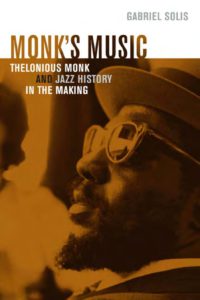
Browse in the Library:
| Artist or Composer / Score name | Cover | List of Contents |
|---|---|---|
| Astor Piazzola Oblivion Guitar Arr. By Nadja Kossinskaja |
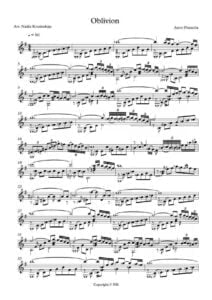 |
Piazzola Oblivion Guitar arr. by Nadja Kossinskaja page 1-1 |
| Astor Piazzolla 12 Tangos Piano |
 |
|
| Astor Piazzolla 6 Tangos |
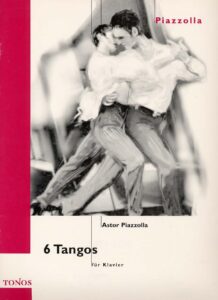 |
Astor Piazzolla 6 Tangos |
| Astor Piazzolla Angel (Complete) For Piano (Different Version) |
 |
Astor Piazzolla Angel (Complete) For Piano (Different Version) |
| Astor Piazzolla Ave Maria (Piano) |
 |
|
| Astor Piazzolla Balada Para Un Loco (Cacho Tirao) Guitar |
 |
|
| Astor Piazzolla Maria De Buenos Aires, Opera Tango (Partitura completa) |
 |
|
| Astor Piazzolla Milonga Del Angel (Piano Solo) Arranged By Prof. John Mortensen Slow Tango |
 |
|
| Astor Piazzolla Milonga Del Angel (Piano Solo) Original |
 |
|
| Astor Piazzolla sheet music Le Grand Tango Score For Viola And Piano |
 |
|
| Astor Piazzolla Vuelvo al sur (piano) |
 |
|
| Astor Piazzolla – 5 piezas para guitarra (guitar sheet music) | Astor Piazzolla – 5 piezas para guitarra (guitar sheet music) | |
| Astor Piazzolla – Picasso (Tango) Piano |
 |
|
| Astor Piazzolla 4 Estaciones Porteñas Guitar arr. |
 |
|
| Astor Piazzolla Nightclub 1960 Duo Flute Guitar |
 |
|
| Astor Piazzolla – Adios Nonino (Two Pianos) | Astor Piazzolla – Adios Nonino (Two Pianos) | |
| Astor Piazzolla – Adiós Nonino (guitar sheet music) |
 |
|
| Astor Piazzolla – Adios Nonino Piano Solo |
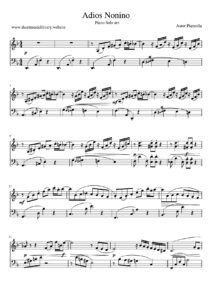 |
|
| Astor Piazzolla – Album No. 1 |
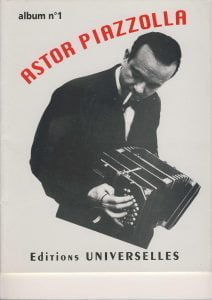 |
Astor Piazzolla album no 1 |
| Astor Piazzolla – Album No. 2 |
 |
Astor Piazzolla – Album No. 2 |
| Astor Piazzolla – Album No. 4 |
 |
Astor Piazzolla – Album No. 4 |
| Astor Piazzolla – Buenos Aires Hora Cero | Astor Piazzolla – Buenos Aires Hora Cero | |
| Astor Piazzolla – Chau Paris (piano) | Astor Piazzolla – Chau Paris (piano) | |
| Astor Piazzolla – Complete Works – Obras Para Piano Y Varios Instrumentos (partituras, sheet music) | Astor Piazzolla – Complete Works – Obras Para Piano Y Varios Instrumentos (partituras, sheet music) | |
| Astor Piazzolla – Contrastes (Piano) | Astor Piazzolla – Contrastes (Piano) | |
| Astor Piazzolla – Coral (Piano) | Astor Piazzolla – Coral (Piano) | |
| Astor Piazzolla – Estaciones Porteñas for piano – für Klavier |
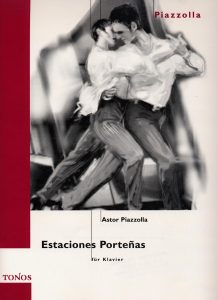 |
Astor Piazzolla – Estaciones Portenas fur Klavier |
| Astor Piazzolla – Fuga 9 (Piano) | Astor Piazzolla – Fuga 9 (Piano) | |
| Astor Piazzolla – Invierno Porteno (guitar sheet music) |
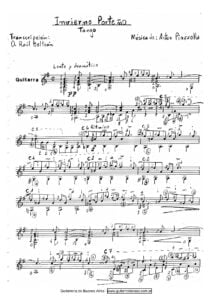 |
|
| Astor Piazzolla – Invierno porteño [clarinet-piano] |
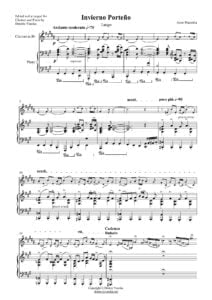 |
|
| Astor Piazzolla – La Muerte Del Angel (Guitar arr. sheet music) |
 |
|
| Astor Piazzolla – Libertango (Part A – Guitar Arr.) (Musescore File).mscz | ||
| Astor Piazzolla – Libertango for 2 pianos | Astor Piazzolla – Libertango 2KL | |
| Astor Piazzolla – Los pajaros perdidos (canción) piano vocal |
 |
|
| Astor Piazzolla – Milonga Del Angel (guitar arr. sheet music) |
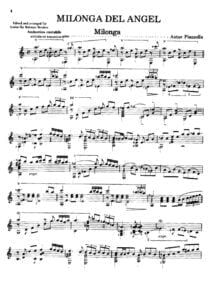 |
|
| Astor Piazzolla – Milonga del angel (Piano solo) |
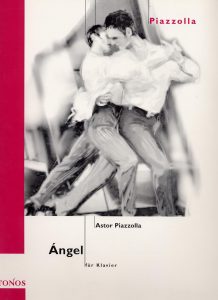 |
Astor Piazzolla – Milonga del angel |
| Astor Piazzolla – Oblivion (piano solo ver.) | Astor Piazzolla – Oblivion (piano solo sheet music) | |
| Astor Piazzolla – Oblivion (piano solo) |
 |
|
| Astor Piazzolla – Oblivion arr. by Najda Kssinskaja (Guitar arr. sheet music with TABs) | Astor Piazzolla – Oblivion arr. by Najda Kssinskaja (Guitar arr. sheet music with TABs) | |
| Astor Piazzolla – Oblivion Cello & piano | Piazzolla Oblivion cello piano arr. | |
| Astor Piazzolla – Oblivion for Piano solo sheet music (partitura) |
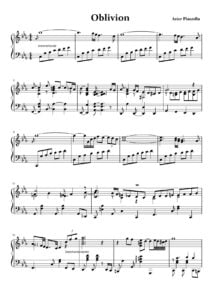 |
|
| Astor Piazzolla – Onda Nueve (Tango) Piano | Astor Piazzolla – Onda Nueve (Tango) Piano | |
| Astor Piazzolla – Otoño Porteño (guitar sheet music) | Astor Piazzolla – Otoño Porteño (guitar sheet music) | |
| Astor Piazzolla – Piano SongBook (Angel, Libertango, 6 Tangos, Estaciones Porteñas) |
 |
|
| Astor Piazzolla – Preludio 9 (Piano) | Astor Piazzolla – Preludio 9 (Piano) | |
| Astor Piazzolla – Río Sena (Tango) Piano | Astor Piazzolla – Río Sena (Tango) Piano | |
| Astor Piazzolla – Romanza del Duende (Piano) | Astor Piazzolla – Romanza del Duende (Piano) | |
| Astor Piazzolla – sheet music – Suite del Angel (Piano) |
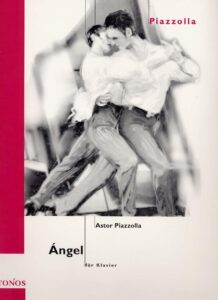 |
|
| Astor Piazzolla – Soledad (Solitude) Full score sheet music | Astor Piazzolla – Soledad (Solitude) Full score sheet music (first page) | |
| Astor Piazzolla – Suite Troileana 2 guitars (Bandoneon, Zita, Whisky, Escolaso) |
 |
|
| Astor Piazzolla – Suite Troileana 2 guitars arr. Sergio Assad (Bandoneon, Zita, Whisky, Escolaso) |
 |
|
| Astor Piazzolla – Suite Troileana arr for Piano (Bandoneon, Zita, Whisky, Escolaso) |
 |
|
| Astor Piazzolla – Tangos for 2 Pianos |
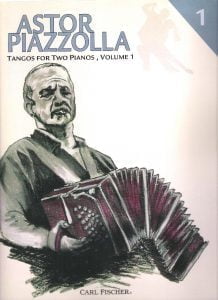 |
Astor Piazzolla – Tangos for 2 Pianos |
| Astor Piazzolla – Tangus Dei (Piano) |
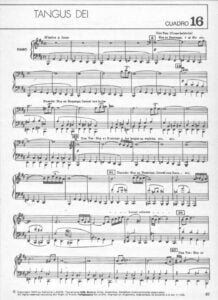 |
|
| Astor Piazzolla – The Last Tango Music Of Guitar arr. |
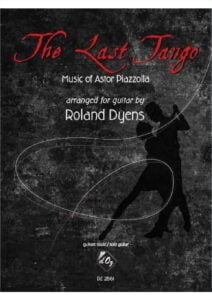 |
|
| Astor Piazzolla – Tristango (Piano) | Astor Piazzolla – Tristango (Piano) | |
| Astor Piazzolla – Vuelvo Al Sur (10 tangos and other pieces arr. piano) |
 |
Astor Piazzolla – Vuelvo Al Sur |
| Astor Piazzolla -Four, For Tango – Score |
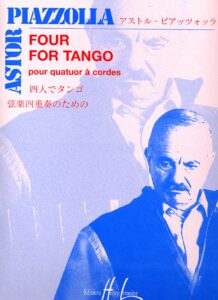 |
|
| Astor Piazzolla (Spanish Español Ed. 2018 El Ateneo 2020) (María Susana Azzi) Biography Book |
 |
|
| Astor Piazzolla (Tango) Balada Para Un Loco – Guitar (letra Horacio Ferrer) |
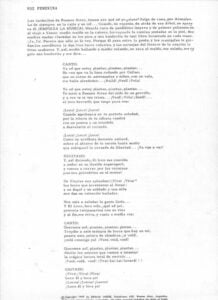 |
|
| Astor Piazzolla 100 Años Edicion Aniversario Sus mejores obras para piano |
 |
Astor Piazzolla 100 Años Edicion Aniversario Sus mejore obras para piano |
| Astor Piazzolla 25 Tangos for Clarinet and piano Clarinet Part in Bb |
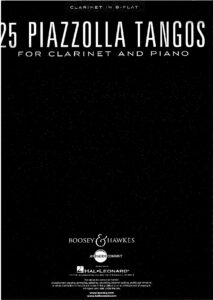 |
Astor Piazzolla 25 Tangos for Clarinet and piano Clarinet Part in Bb |
| Astor Piazzolla 28 tangos arranged For Piano |
 |
Astor Piazzolla 28 tangos arranged For Piano |
| Astor Piazzolla Album 20 compositions arr. for Piano |
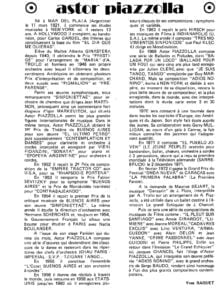 |
Piazzolla album |
| Astor Piazzolla Ave Maria (Piano and voice) |
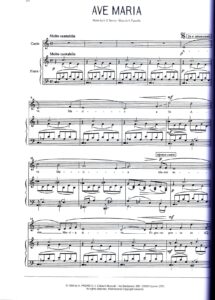 |
|
| Astor Piazzolla Cinco Piezas For Guitar |
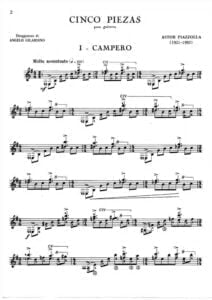 |
|
| Astor Piazzolla Color de Buenos Aires Suite letra Horacio Ferrer |
 |
|
| Astor Piazzolla Contrabajeando Double Bass And Piano Contrabajo Y Piano |
 |
|
| Astor Piazzolla Extasis Piano (Tango) |
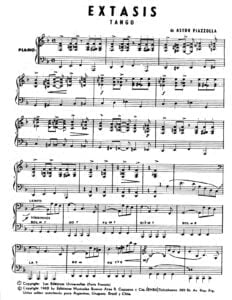 |
|
| Astor Piazzolla Flute or Violin Piano Collection |
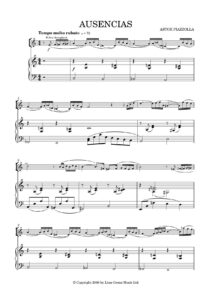 |
|
| Astor Piazzolla For Violin And Guitar (Astor Piazzolla) |
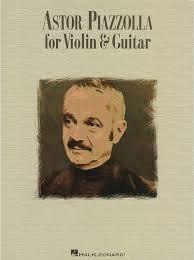 |
Astor Piazzolla For Violin And Guitar (Astor Piazzolla)_compressed |
| Astor Piazzolla Guitar compositions Collection (Guitarra) sheet music, partituras | Astor Piazzolla Guitar compositions (Guitarra) sheet music, partituras | |
| Astor Piazzolla Horacio Ferrer Chiquilin De Bachin Piano vocal |
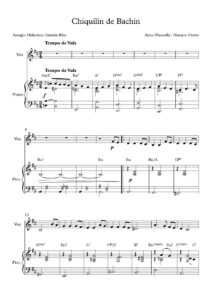 |
|
| Astor Piazzolla La Muerte Del Angel Trio Violin Cello Piano Score |
 |
|
| Astor Piazzolla Le Grand Tango – Two Pianos | Astor Piazzolla Le Gran Tango – Two Pianos | |
| Astor Piazzolla Libertango (Guitar Solo Arr.) With Tab |
 |
|
| Astor Piazzolla Milonga Del Àngel (For Chamber Orchestra) Tangos |
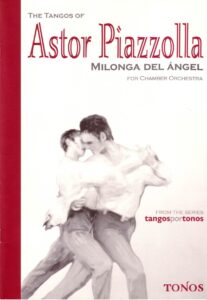 |
|
| Astor Piazzolla Oblivion (piano solo) |
 |
|
| Astor Piazzolla Oblivion arr. for 2 violins |
 |
|
| Astor Piazzolla Oblivion for Violin or Flute Cello Piano | Astor Piazzolla Oblivion for Violin or Flute Cello Piano | |
| Astor Piazzolla Oblivion Trans Solo Piano | Astor Piazzolla Oblivion Trans Solo Piano sheet music pdf | |
| Astor Piazzolla Oblivion Violin Guitar |
 |
|
| Astor Piazzolla Obras Completas Guitarra For Guitar |
 |
Astor Piazzolla Obras Completas For Guitar |
| Astor Piazzolla Piano Collection |
 |
Astor Piazzolla Piano Collection |
| Astor Piazzolla Piano Meditango |
 |
|
| Astor Piazzolla Romance Del Diablo Flauta Violin and Piano |
 |
|
| Astor Piazzolla Sensuel Piano |
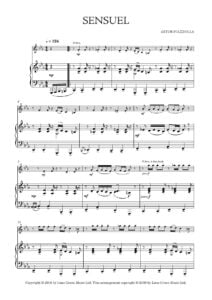 |
|
| Astor Piazzolla Tangazo for Orchestra Variaciones sobre Buenos Aires para orquestra |
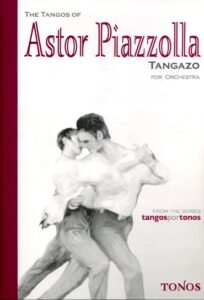 |
|
| Astor Piazzolla Tango Etudes (for flute or Violin) | Astor Piazzolla Tango Etudes (for flute or Violin) | |
| Astor Piazzolla Tango S V P For Violin Ensemble Solo | Astor Piazzolla Tango S V P For Violin Ensemble Solo | |
| Astor Piazzolla Tangos Arr Phillip Keveren The Phillip Keveren Series Piano Solo |
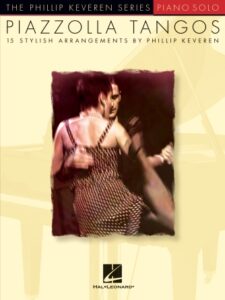 |
Astor Piazzolla Tangos Arr Phillip Keveren The Phillip Keveren Series Piano Solo |
| Astor Piazzolla Tanti Anni Prima Ave Maria For Piano solo |
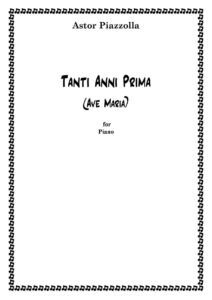 |
|
| Astor Piazzolla Tanti Anni Prima Ave Maria Violin and Piano |
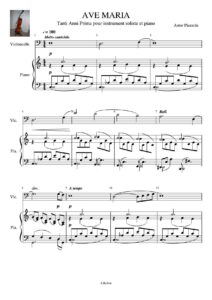 |
|
| Astor Piazzolla Vuelvo Al Sur Flute or Violin and Piano | Astor Piazzolla Vuelvo Al Sur Flute or Violin and Piano | |
| Astor Piazzolla y Anibal Troilo- Contrabajeando (Tango) Piano | Astor Piazzolla y Anibal Troilo- Contrabajeando (Tango) Piano | |
| Atlantic Starr – Always | ||
| Atomic Kitten – The Tide Is High | ||
| Atomic The Musical By Philip Foxman And Danny Ginges Piano Vocal Score |
 |
|
| Atonement – Dario Marianelli (For Piano) |
 |
Atonement – Dario Marianelli (For Piano) |
| Au Clair De La Lune – Traditional (Musescore File).mscz | ||
| Audioslave Out Of Exile Guitar TABs |
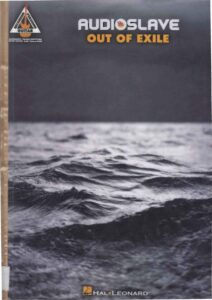 |
Audioslave Out Of Exile Guitar TABs |
| Audition (The Fools who Dream) La La Land OST | ||
| Audra Mcdonald Build A Bridge (Songbook) (Audra Mcdonald) Piano Vocal Guitar chords |
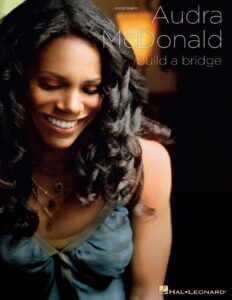 |
Audra Mcdonald Build A Bridge (Songbook) (Audra Mcdonald) Piano Vocal Guitar chords |
| Augustana – Boston | ||
| Aura Lee (intermediate great jazz arrangement) G. Poulton | Aura Lee Jazz | |
| Aura Lee By G. Poulton Jazz Arrangement.mxl | ||
| Aura Lee G. Poulton (Easy version ) | Aura Lee Easy version | |
| Aura Lee Jazz (Musescore File).mscz | ||
| AURORA Conqueror Piano Solo arr. |
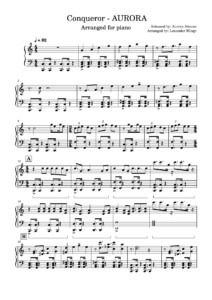 |
|
| AURORA Running With The Wolves |
 |
|
| Aurora – Cure For Me |
 |
|
| AURORA Forgotten Love Piano with lyrics |
 |
|
| AURORA Half The World Away Sheet Music Piano Vocal Guitar chords |
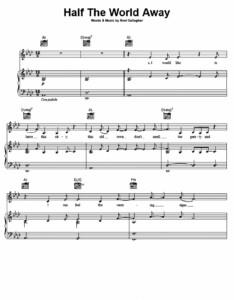 |
|
| AURORA Into The Unknown from Disney’s Frozen |
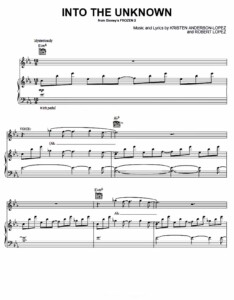 |
|
| AURORA It Happened Quiet Piano Solo arr. |
 |
|
| AURORA Runaway Piano Vocal guitar Chords |
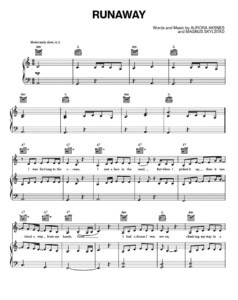 |
|
| AURORA Songbook Sheet Music Anthology Collection | AURORA Songbook Sheet Music Anthology Collection | |
| AURORA The River Aurora Piano Solo arr. |
 |
|
| Automatic Harmonic Analysis of Jazz Chord Progressions Using a Musical Categorial Grammar (Mark Wilding) | Automatic Harmonic | |
| Autour Du Jazz Guitar 4 pièces pour guitare (Thierry Tisserand) |
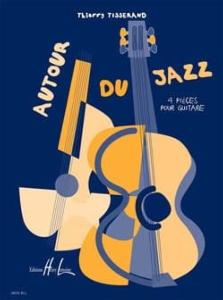 |
Autour Du Jazz Guitar 4 pièces pour guitare (Thierry Tisserand) Contents — autour du jazz |
